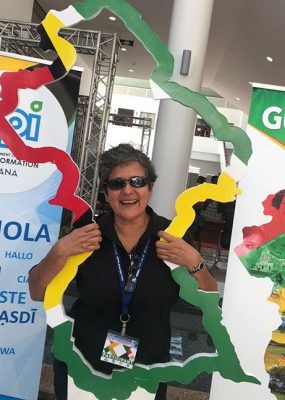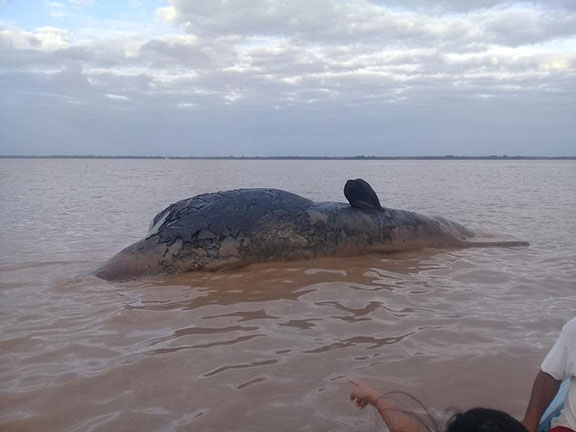The carcass of a young whale measuring approximately 30 feet, has been spotted floating in the Essequibo River and authorities are working to locate it and have it buried.
President of the Guyana Marine Conservation Society (GMCS) and conservationist Annette Arjoon-Martins yesterday told Stabroek News that the authorities are currently gathering information on the location of the whale.
The whale, Arjoon-Martins explained, was spotted by a fisherman at Wakenaam on Saturday morning and at Troolie Island at around 6.40am yesterday. The conservationist said that the whale, which is a young male sperm whale, is still floating in the river and they have asked fishermen to be on the lookout for it.

She said that once the mammal is grounded, they will be able to mobilise support to bury it.
“It has been moving because of the tides and once it is landed and located, we will be able to mobilise a team in 30 minutes and head to the location. I have asked the fishermen and pilots flying from Mabaruma to check for it also,” she said.
Arjoon-Martins further pointed out that they are liaising with Antonio Mignucci from the Puerto Rico Manatee Conservation Centre. Mignucci, she said, has volunteered his service and will be offering his assistance.
Dr Calvin Bernard, Dean of the Natural Sciences faculty at the University of Guyana, last night told this newspaper that they will have to examine the carcass to determine its cause of death and take DNA samples to confirm the species and gender.
“At this point, there is no reason to have it transported and buried in the city given it size. If it is anything, we may have to exhume it,” Bernard said when asked how they intend to dispose of the remains.
Bernard noted that they will be working along with the Wildlife Conservation and Management Commission, the World Wildlife Fund and a team from the University of Guyana.
Also on board with the team, Arjoon-Martins said, is Denzil Roberts from the Ministry of Agriculture’s Department of Fisheries. She explained that he was briefed on the situation and has pledged his support.
With this discovery, the conservationist called on authorities to implement a training and awareness programme in communities. “We have to do this work in a structured fashion. We should have marine monitoring groups in the communities so they can be our eyes and ears. The people in the community will be our best stewards,” she said, while calling for training on how to handle wildlife cases such as this, to be offered.

